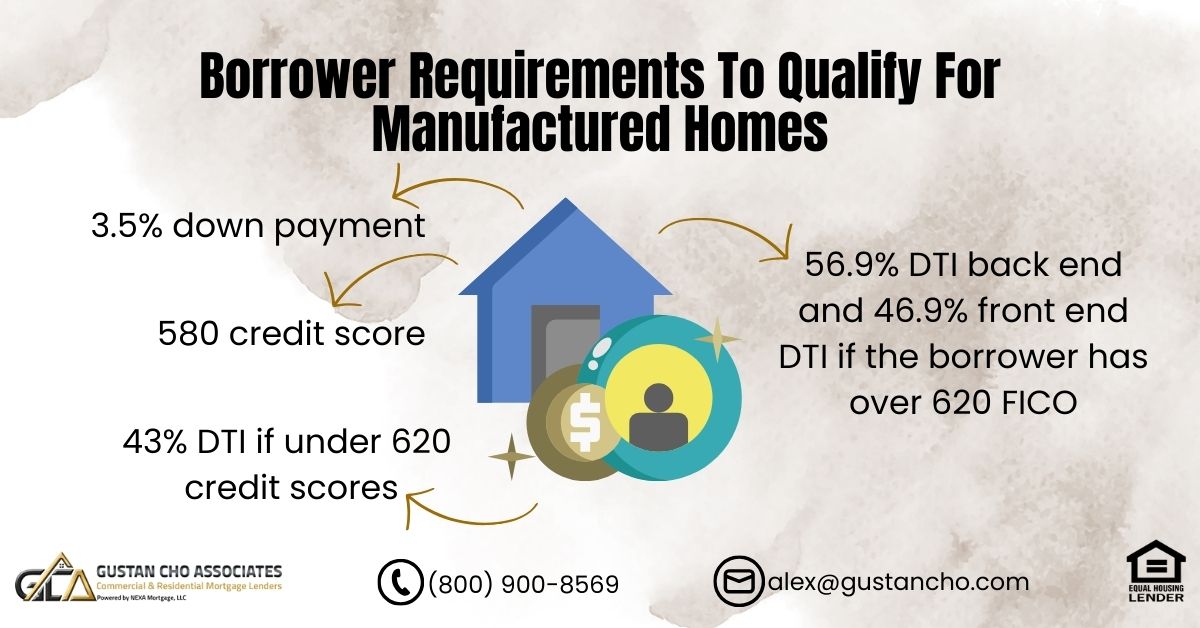-
Can Lenders Allow Tie Downs on Manufactured Homes on FHA loans
Posted by Ollie on February 25, 2024 at 4:53 pmCan Lenders Allow Tie Downs on Manufactured Homes on FHA loans?
Stanley replied 1 year, 3 months ago 4 Members · 4 Replies -
4 Replies
-
As of HUD 4000.1 FHA Handbook Guidelines last update in January 2024, FHA (Federal Housing Administration) guidelines for manufactured homes are subject to change, so it’s always best to consult directly with a qualified lender or loan officer with expertise on FHA manufactured home loans or the most accurate and up-to-date information. However, generally speaking, tie-downs for manufactured homes are typically required for FHA loans.
Tie-downs are essential for securing the manufactured home to its foundation, ensuring stability and safety. HUD guidelines on modular and manufactured homes usually mandate that manufactured homes meet specific standards for structural integrity, including tie-down requirements.
These tie-down systems are part of the broader set of requirements established by the Housing and Urban Development Manufactured Home Guidelines to ensure the safety and durability of manufactured homes financed through their programs. Compliance with these guidelines is crucial for FHA loan approval.
Lenders specializing in FHA loans should be well-versed in the specific requirements for manufactured homes and can provide guidance on tie-downs and other aspects of FHA financing for these properties. Always consult with your lender or loan officer for the most accurate information tailored to your specific situation.
HUD (U.S. Department of Housing and Urban Development) regulations for manufactured homes typically require that these homes be affixed to a permanent foundation to qualify for certain financing programs, such as FHA (Federal Housing Administration) loans. This requirement is meant to ensure the stability and safety of the home, as well as to meet local building codes and regulations.
While a permanent concrete foundation is commonly used, other types of foundations may also be acceptable depending on local codes and HUD guidelines. These could include pier and beam, slab-on-grade, or other approved foundation types.
It’s important for homeowners to consult with local authorities and lenders to ensure compliance with all relevant regulations and requirements for affixing a manufactured home to a foundation.
-
From what I have been told is that manufactured homes need to be affixed to a fixed concrete foundation. Here is a blog from Gustan Cho Associates about manufactured homes and lending guidelines
https://gustancho.com/fha-guidelines-on-manufactured-home-loans/
gustancho.com
FHA Guidelines on Manufactured Home Loans
FHA Guidelines on manufactured home loans require the home need to be permanently fixed to a concrete foundation, basement, or crawl space.
-
Here is the HUD, the parent of FHA, guidelines on FHA loans regarding manufactured homes on FHA loans.
https://www.hud.gov/program_offices/housing/rmra/mhs/faqs
hud.gov
Manufactured Housing and Standards- Frequently Asked Questions
Manufactured Housing and Standards- Frequently Asked Questions
-
Yes, manufactured homes can be fixed to the ground using tie downs. Tie downs are essential for securing manufactured homes, also known as mobile homes, to the ground to prevent them from being displaced or damaged during high winds, storms, or other adverse weather conditions.
Tie downs typically consist of straps, cables, or rods that are anchored to the ground and connected to the frame of the home. They help distribute the forces exerted by wind or other forces and keep the home in place.
Proper installation of tie downs is crucial for ensuring the stability and safety of the manufactured home. These tie downs are usually installed according to specific guidelines and regulations set by local building codes or manufactured housing standards. It’s important to consult with professionals who are knowledgeable about manufactured home installation to ensure that tie downs are installed correctly and effectively.
HUD (U.S. Department of Housing and Urban Development) does not necessarily require manufactured homes to be affixed on a permanent concrete foundation. However, HUD does set standards and regulations for the installation of manufactured homes to ensure safety and structural integrity.
The specific requirements for the foundation and installation of manufactured homes can vary depending on factors such as location, local building codes, and the type of home being installed. While some jurisdictions may require manufactured homes to be placed on a permanent concrete foundation, others may allow for alternative foundation systems such as piers, pilings, or concrete runners.
HUD’s regulations, outlined in the HUD Code (also known as the Manufactured Home Construction and Safety Standards), primarily focus on the design, construction, transportation, and installation of manufactured homes to ensure they meet certain safety and quality standards. These regulations provide guidelines for anchoring and support systems to ensure the stability and safety of manufactured homes in various environmental conditions, including high winds and seismic activity.
Ultimately, compliance with HUD regulations and any additional local requirements is essential to ensure that manufactured homes are safely installed and meet applicable standards for structural integrity and safety. It’s important for homeowners, manufacturers, and installers to be familiar with and adhere to these regulations during the installation process.

